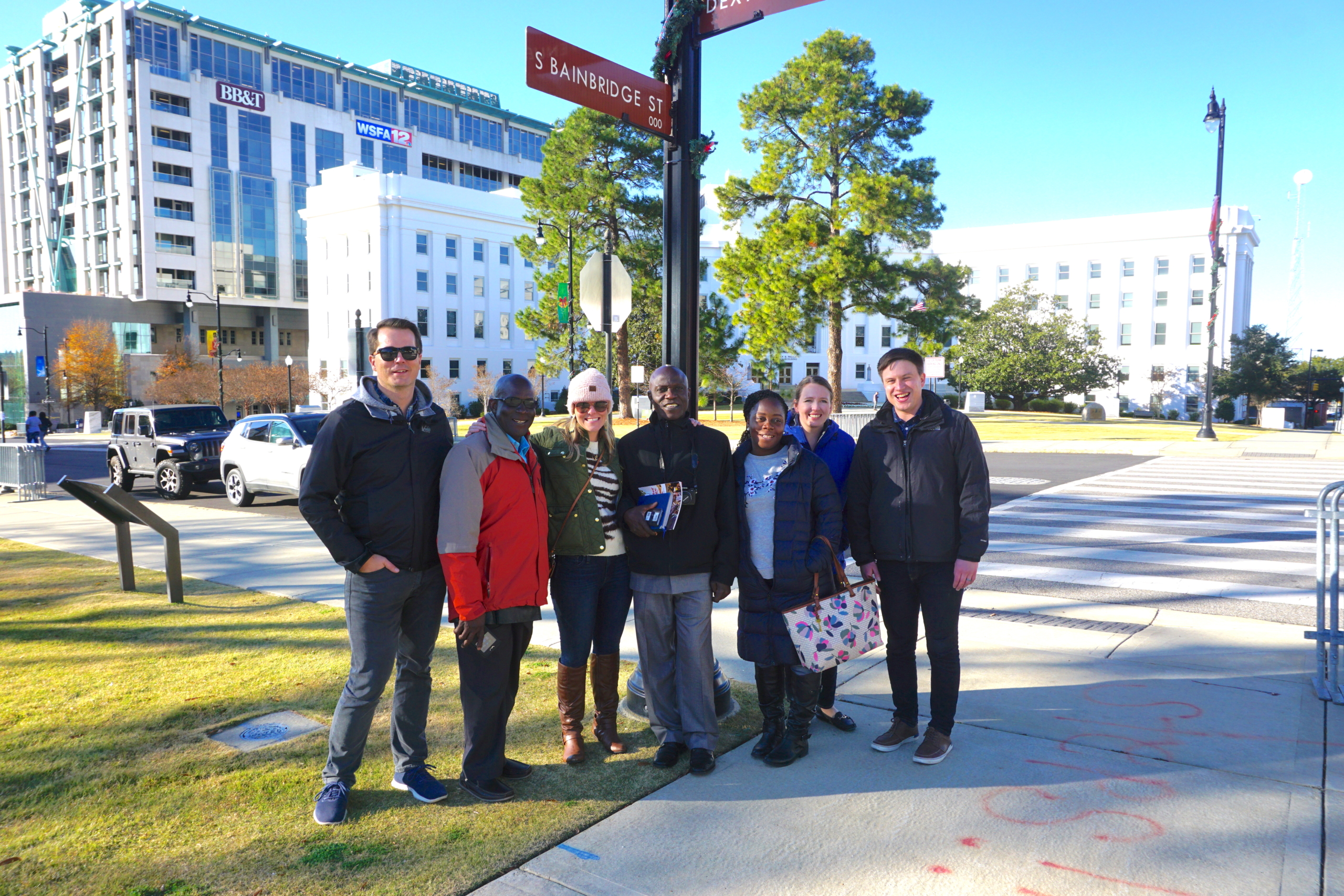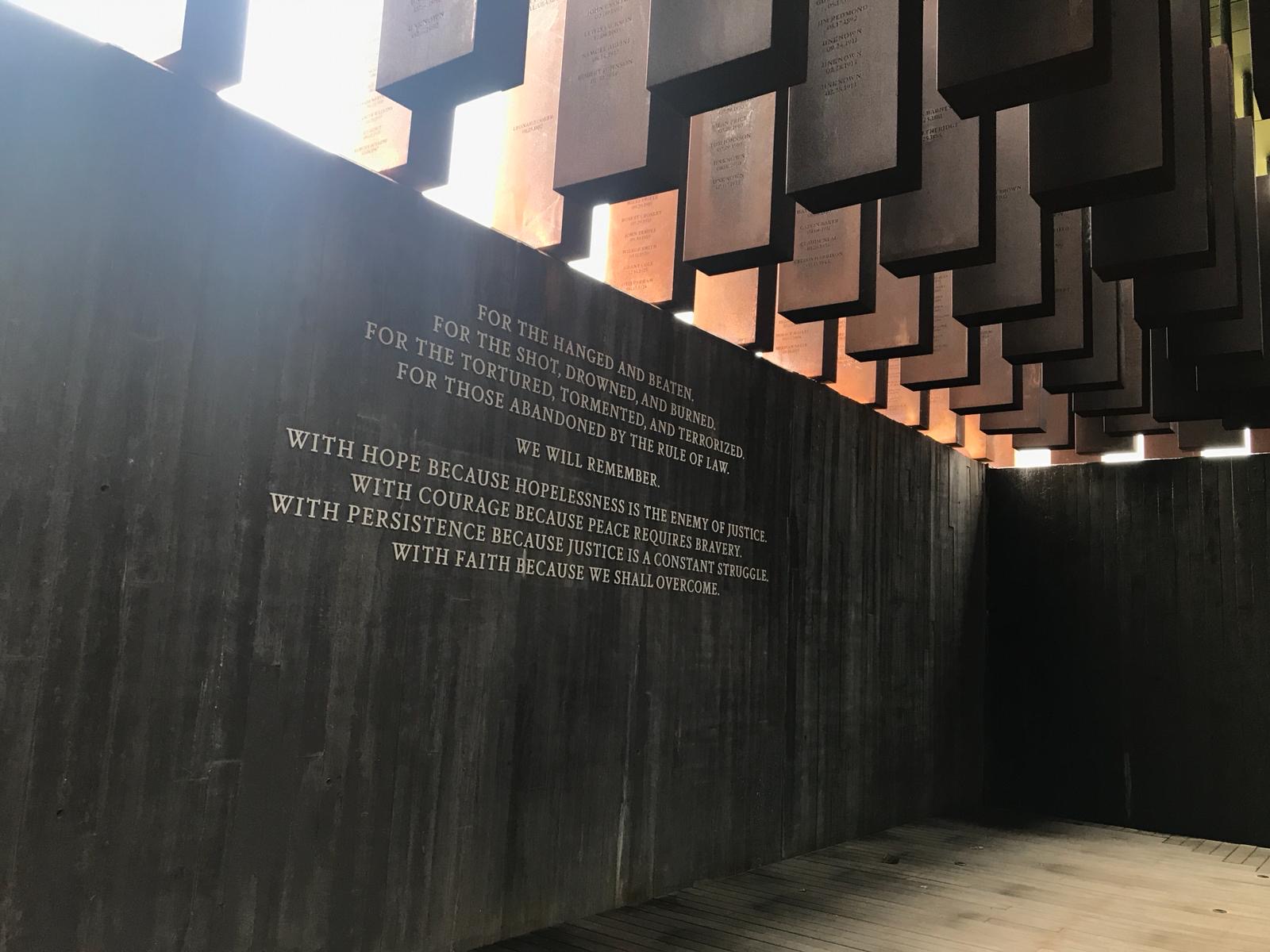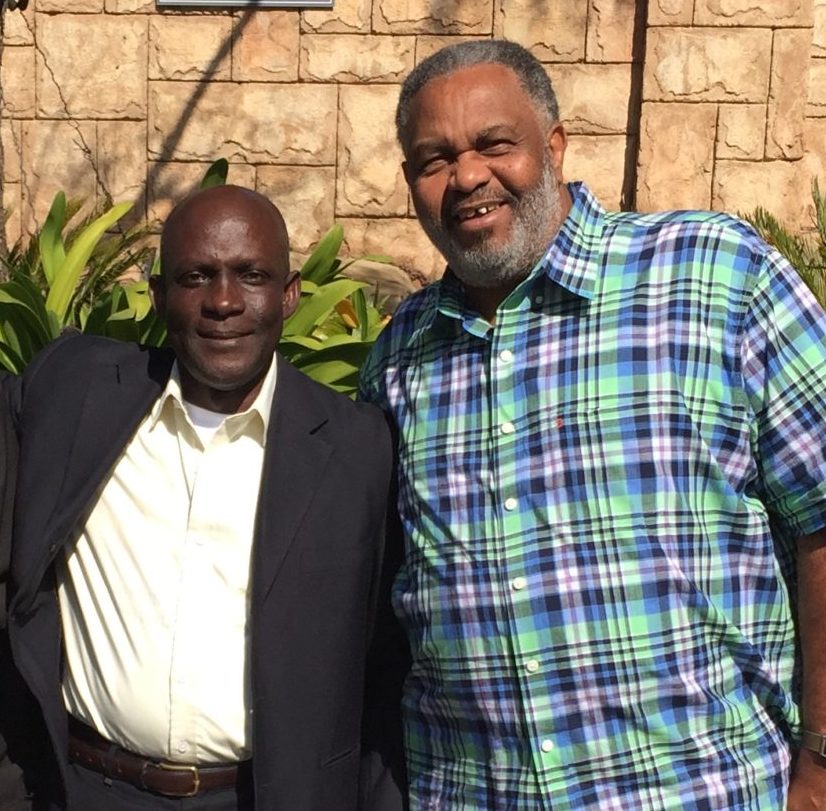
Last Mile Health staff in Montgomery, Alabama. From left to right: Nathan Hutto, Ben Grant, Ami Waters, Lorenzo Dorr, Savior Mendin, Brittney Varpilah, and Dan Owens.
Through the generosity of an anonymous partner, nine members of the Last Mile Health team from the United States and Liberia were offered an opportunity to travel to Montgomery, Alabama to visit the Equal Justice Initiative’s museum and memorial. A non-profit founded in 1989 by acclaimed lawyer Bryan Stevenson, Equal Justice Initiative seeks to reform the criminal justice system in the United States and to foster meaningful changes to the narrative about race in America. In 2018, Equal Justice Initiative opened the National Memorial for Peace and Justice—a deeply moving monument dedicated to the victims of lynching, which is characterized by 805 six-foot steel beams representing each of the counties in the United States where a documented lynching took place. The memorial is complemented by the Legacy Museum: From Enslavement to Mass Incarceration, which educates visitors on the history of slavery and racism in the United States and its enduring impact on today’s society.

The 805 six-foot steel beams of the National Memorial of Peace and Justice represent each of the counties in the United States where a documented lynching took place.
One of our values is we are all teachers and learners, and our staff were humbled by the opportunity to learn about the legacy of enslaved black people in the United States. For members of our team like Ben Grant, Liberia Program Director, this trip was personal. Ben’s great-great-grandfather immigrated to Liberia as a freed slave from Mississippi, so this was a powerful journey to trace his family’s roots. He said, “Liberia’s history is closely linked to the US.” In 2018, Ben had the opportunity to meet Anthony Hinton, an African American man who was wrongly imprisoned for 30 years and defended by Equal Justice Initiative, during a celebration of Nelson Mandela’s 100th birthday in Johannesburg, South Africa. “It was amazing listening to him telling me his story and the injustices he suffered… Despite decriminalization of slavery, there was massive incarceration of African Americans for little to no reason. It was a gross injustice,” Ben described.
The trip also underscored the importance of understanding how history shapes contemporary social justice issues—particularly access to healthcare. “The experience, history, and time together was a powerful reminder of the contributions and legacy that racial violence have even today, and even in public health. It reminds us that we live in history and should deeply understand the relevant history that brings us to where we are,” explained Nathan Hutto, Chief People Officer. Savior Mendin, Grand Bassa, Liberia County Manager, added, “Even though slavery was long ago, it has evolved over time. This memorial is confronting what happened in the past and is still happening in the form of the justice system.”
Ultimately, this experience will inform our ongoing work to build a diverse, equitable, and inclusive workplace dedicated to delivering dignified and high-quality primary healthcare to remote communities.
“I feel that sharing this experience with my colleagues made me all the more aware of the power dynamics that continue to exist. I am resolute to carry this awareness forward and to seek ways to disrupt it—to listen more, speak less, and to question whose voice should be amplified.”
Dr. Ami Waters, Co-Medical Director in Liberia
“[I now have] a greater awareness/appreciation of how the history of slavery and racial oppression in the US continues to impact Liberian society. I am committed to growing my awareness of these topics and will actively try and break down these systems both in the US and in Liberia.”
Brittney Varpilah, Director of National Community Health Systems in Liberia
“We can help contribute to changing the narrative by our actions. In my work, I can promote the dignity of my patients by making them equal partners in decision-making regarding their health. I can demonstrate to people in rural communities that they have capacity and power by listening and learning from them as opposed to me giving all the answers. I can promote diversity and inclusiveness in my workplace by acknowledging and regarding my colleagues foremost as my brothers and sisters. I can also practice the concept of redemption in my personal and professional relationships because in the end, we are all in need of forgiveness and grace. Above all, we can collectively strive to spread love and overcome hate to help make the world a better place for all.”
Savior Mendin, Grand Bassa County Manager in Liberia
We stand in solidarity with the Equal Justice Initiative, and our team is grateful for their tireless work to combat racial injustice and create spaces for public education and reflection on the legacy of racism in the United States. To learn more about the Equal Justice Initiative, National Memorial for Peace and Justice, and Legacy Museum, please visit www.museumandmemorial.eji.org.





